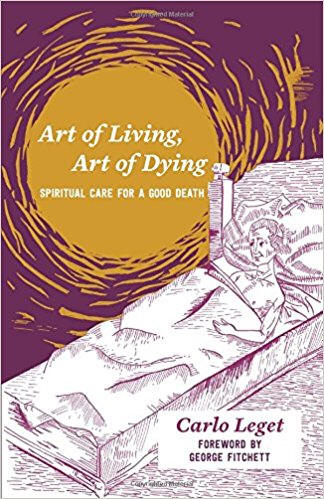Book Review
Art of Living, Art of Dying
Spiritual Care For A Good Death
Carlo Leget
Jessica Kingsley Publishers (21 March 2017)
ISBN:
978-1785922114
 I must admit that I was
hoping for a Thomistic analysis of the subject, having read his previous
work. But, as it turned out, I found this book very helpful, easy to read
and I recommend it to those in health care.
I must admit that I was
hoping for a Thomistic analysis of the subject, having read his previous
work. But, as it turned out, I found this book very helpful, easy to read
and I recommend it to those in health care.
Leget, a professor in Care Ethics in Utrecht, notes that the Dutch have a problem with accepting authority. In the context of the subject of death, a personal experience if ever there is one, the person-centered approach seems eminently sensible. As a clinician, my own ethical beliefs must be secondary to the beliefs of the dying person, with one obvious exception that Leget does not mention: my own deeply held beliefs must also be respected if and when ethical boundaries are being crossed, namely, acts of euthanasia.
Human beings cannot live without meaning, says Leget. Victor Frankl famously discovered this in the hell of Auschwitz. Meaning is what keeps us going. I concur with this: one of those individuals known as a celebrity recently stated that while she does not personally visit a place of worship, she accepts that there is something more to life than living and dying. She must represent an awful lot of people these days. The challenge for us is to reach out to these people in their last moments without wanting to impose our beliefs when they are at their most vulnerable. We begin our dialogue by noting the principle that meaning is what keeps us going.
Death was big in Victorian England, with plenty of sentimental songs to accompany its moments. Leget notes that from the beginning of the twentieth century, death lost its meaning and became something shameful. More and more, the dying process was placed outside the family circle and in the hospital. One cannot help but notice that this medicalizing of death took place during a time of doubt with regard to Christian beliefs.
With palliative care, we have come around to accepting spirituality in its broadest context: palliative care looks at the physical, psycho-social and the spiritual. Spiritual care, however, is the least integrated into the medical framework.
The book aims to develop an "Ars moriendi" approach to its subject, a spiritual framework that helps the patient and caregiver to meet and discuss what it means to die. The book succeeds very well in using this approach with many reflections or clinical vignettes granted to the reader.
Leget notes that clinical practice is increasingly regulated by guidelines and protocols, which takes a Kantian and utilitarian approach for granted. He suggests an alternative approach: virtue ethics. After all, the care or vulnerable people is only possible in a culture of trust. Virtue ethics takes relationships and dependency for granted. In contrast, says Leget, we have a neoliberal ideology where human beings are seen as autonomous and self-reliant. Dependency and vulnerability are seen as weakness or defect. The dependent person, in this world of market economies, falls short of the ideal of a strong, self-reliant individual. The vulnerable person is being dehumanized. I might add that the vulnerable person can be easily tempted to regard himself or herself as someone who is being a burden on society. To overcome this, we need a dignity therapy that works hand in glove with the ars moriendi approach.
All in all, I found this to be a helpful and easy to read work.
Reviewed by Dr Pravin Thevathasan
